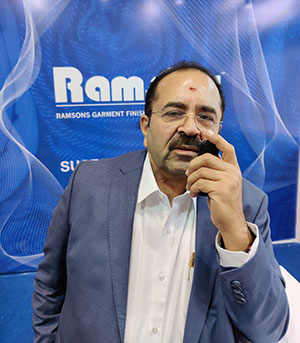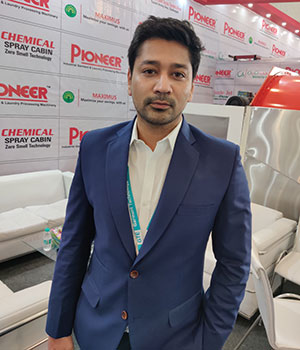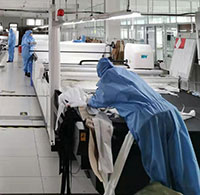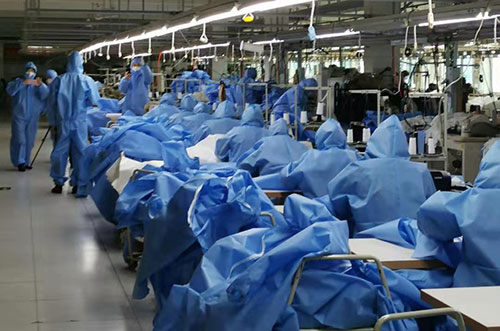FW
Everlane plans to use only certified organic cotton by 2023. Two years back, Everlane began sourcing ethical cotton from Madhya Pradesh. Now the brand will up its use of the region’s cotton, which is certified organic. The new commitment will begin with organic cotton T-shirts--a homage to the brand’s debut T-shirt launched in 2011.
US-based Everlane, is known for its ethical brand promise -- including its radical transparency policy regarding the pricing and sourcing of its products. Everlane, launched in 2011, has a revolutionary message about material and supply chain traceability. The organization works with brands and manufacturers to improve operations throughout their supply chains. The brand has mindful of its impact on the environment through the materials and processes it uses. Previous environmental efforts include: a pledge in 2018 to eliminate all virgin plastic from its supply chain by 2021; launch of an eco-friendly footwear line in 2019, et al. All silk produced by Everlane will be dyed and washed with 100 per cent recycled water and 100 per cent renewable energy by 2022.
Cotton farming uses more toxic pesticides per acre than any other crop worldwide, damaging local groundwater, streams and rivers and endangering local people and wildlife.
As garment factories stall because of the coronavirus or shutter production lines because of raw material shortages or reduced orders, garment workers come under heavy pressure.
Garment workers earn poverty wages that barely cover their basic needs, let alone tide them over for emergencies or periods of unemployment. Whether temporary or permanent, the economic fallout from these factory closures will have far-reaching consequences for garment workers living in precarious circumstances. If workers are laid off, they have to fight for their dues. Migrant workers, specifically, may face further isolation or xenophobia.
The situation is especially precarious in Cambodia and Myanmar, where tens of thousands of garments workers have lost their jobs in the wake of supply-chain disruptions or production slowdowns. In Cambodia, factories have cut off workers without authorization, leaving many in debt and unable to afford monthly loan repayments. Because many facilities in Myanmar opened within the past five years, and the turnover of workers is significant, many workers will be left with nothing.
The coronavirus pandemic is upending supply chains, roiling financial markets and straining medical infrastructures across the globe. In addition, when factories reopen, deadlines should be reassessed to prevent laborers from working mandatory overtime to make up for delays.
According to Jayanta Roy, Senior Vice-President and Group Head, Corporate Sector Ratings, ICRA, apparel exporters are expected to report a moderate profit this fiscal, with pressures likely to sustain at least in the near term and the turnover growth to be subdued, except for a few larger players with an established client base.
The industry is facing challenges such as increased bargaining power of buyers amid intense competition, cost-side pressures emanating from disruptions in procurement of materials and consumables (such as colours, chemicals, accessories/ trims, etc) from China and write-backs of export incentives booked previously — all of which are expected to adversely impact profitability.
In addition to sustained pressures on liquidity owing to delays in clearance of government dues, a fall of 100150 bps in operating profit of Indian apparel exporters is expected this fiscal.
This may result in a moderation in debt coverage metrics and the impact will be more pronounced for leveraged and smaller companies, with limited bargaining power with customers, modest liquidity cushion and less financial flexibility to absorb the impact.
 For over 60 years, Ramsons has been a pioneer in the design and manufacture of “apparel production” equipment. The company provides technology solutions and import substitution machines for apparel making for hotels and hospitals. It recently showcased its machines at GTE 2020 fair in New Delhi Prakash Belani, Director elaborates.
For over 60 years, Ramsons has been a pioneer in the design and manufacture of “apparel production” equipment. The company provides technology solutions and import substitution machines for apparel making for hotels and hospitals. It recently showcased its machines at GTE 2020 fair in New Delhi Prakash Belani, Director elaborates.
Ramsons is a 60-year old engineering company that adheres to strict sustainability principles. “We reduce water consumption during the washing process by using genuine parts in our machines. We also discharge our effluents with care,” says Prakash Belani Director of the company
Catering to the demand for sewing and garment finishing machines, Ramsons offers manufacturers with inspection machines. “We cover wovens, knits and special fabrics. These fabrics can be checked before cutting and stitching. We provide special washing equipment and storage and handling systems for this. We also offer storage racks and trolleys,” he adds. Besides, the company offers accessories conveyer systems for online stitching which enables easy management of goods in the factory. It emphasises on the correct ironing technology by minimising the use of normal ironing tables. The company also offers form finishers that help it to reduce its labor cost.
According to Belani, investments in the apparel sector are declining as it is a labor intensive sector. “Buyers demand quality goods at lower prices which keeps investors away. However, the number of apparel companies across the country is increasing as we speak so is the evolutionary churn within the existing pack of industry in this given space. The good news here is that Amended Technology Upgradation Fund Scheme (ATUFS) is getting widely accepted due to the subsidies provided and this shall enable the incremental uptick in the technology, automation/ modernization and digitization in this trade going forward,” adds Belani.
 A totally indigenous company, Pioneer Udyog has been participating in the GTE exhibition for the last eight years. The company has gained recognition as the noteworthy manufacturer and supplier of an assorted range of laundry equipment, crinkle machine and dry cleaning machine. Molik Mahajan, Director elaborates on the company’s operations.
A totally indigenous company, Pioneer Udyog has been participating in the GTE exhibition for the last eight years. The company has gained recognition as the noteworthy manufacturer and supplier of an assorted range of laundry equipment, crinkle machine and dry cleaning machine. Molik Mahajan, Director elaborates on the company’s operations.
"We cater to denim wear which evolves every day,” says Mahajan. Earlier the segment included only casual wear. “However now, it also includes formal wear. Its colors are evolving too from the earlier fluorescent to current dark colors,” he adds. Pioneer offer products for the medium scale industries while for the big units, it offers complete automation solutions.
Earlier, the industry focused only on making garments. Now, it focuses more on sustainability. “In compliance with the current environmental laws, brands are marketing their products as eco-friendly,” says Mahajan. The products of Pioneer Udyog too aim to conserve, recycle and minimise water use. The company believes that recycling of water is easier and cost effective than before.
However, according to a new regulation, to recycle water, companies need to first measure the level of the ground water. “They need to install a water meter which is quite expensive. Hence, we encourage customers to reduce their water usage to save their money. Earlier, only big corporates invested their money in recyling. Now, even smaller units are planning to do so. Around ten to 15 percent have already invested in recycling. This figure is likely to increase significantly in the next few years,” adds Mahajan.
"Even before COVID-19 stuck China, many fashion businesses were shifting their production to countries like Vietnam, Cambodia and Bangladesh. However, these countries rely heavily on China for raw materials and other unfinished goods and services. Once their stock imported from China is depleted, they may face the brunt of the supply disruption. As per United Nations Conference on Trade and Development in March, about 20 per cent of global trade in manufacturing intermediate products originated in China."
 Even before COVID-19 stuck China, many fashion businesses were shifting their production to countries like Vietnam, Cambodia and Bangladesh. However, these countries rely heavily on China for raw materials and other unfinished goods and services. Once their stock imported from China is depleted, they may face the brunt of the supply disruption. As per United Nations Conference on Trade and Development in March, about 20 per cent of global trade in manufacturing intermediate products originated in China. European Union and Vietnam are expected to be the worst hit by the disruption in inputs for textile and apparel products.
Even before COVID-19 stuck China, many fashion businesses were shifting their production to countries like Vietnam, Cambodia and Bangladesh. However, these countries rely heavily on China for raw materials and other unfinished goods and services. Once their stock imported from China is depleted, they may face the brunt of the supply disruption. As per United Nations Conference on Trade and Development in March, about 20 per cent of global trade in manufacturing intermediate products originated in China. European Union and Vietnam are expected to be the worst hit by the disruption in inputs for textile and apparel products.
Vietnam imports about 55 to 60 per cent of its garment raw materials from China. The country is a base for companies like the Hong Kong-listed Lever Style Corp, which manufactures for brands including Paul Smith and Hugo Boss. Although its factories are yet to experience any meaningful delays, it has not being able to find supply alternatives beyond China.
Similarly, Uniqlo-owner Fast Retailing Co is also exposed to the outbreak as over half of its sewing factories and fabric mills are located in China and a quarter in Southeast Asia. Many of these sewing factories could face a serious shortfall of raw materials from April if shipments do not resume in March.
fabric mills are located in China and a quarter in Southeast Asia. Many of these sewing factories could face a serious shortfall of raw materials from April if shipments do not resume in March.
China to remain the preferred supplier
The situation highlights the challenges that manufacturers face in diversifying their supply chains. Unlike their Southeast Asian counterparts, South Asian countries such as India and Bangladesh have the entire value chain of textile products within their country. Therefore, in near future though apparel manufacturers may look at these countries for their supplies, China may still remain their preferred supplier once it recovers from the outbreak.
Trade policies to influence decisions
Their decisions may also be influenced by the current trade policies which have disadvantaged several local mills. The country has trade deals with countries like Indonesia and Vietnam while it lacks free trade deals with the European Union, Canada and Australia.
The spread of Coronavirus to Europe and other parts of the world is also likely to be a threat to bigger players such as Industria de Diseño Textil SA and H & M Hennes & Mauritz AB (publ). However, the two companies are relatively lesser exposed to manufacturing shutdowns in China as less than a third of their manufacturing facilities are located in the country. H&M also does not anticipate the coronavirus to delay to its supplies. The Swedish company has temporarily closed 41 of its more than 500 stores in China.
Greece-based yarn maker Varvaressos’ new premium cotton yarn collection saves water, is free of transgenic material and is totally traceable. The yarn maker has unveiled a new generation of smart cotton, created from an innovative and socially responsible system granting sustainability from the cotton seed to the garment, while supporting farmers and businesses. As a master in smart cotton science, the company has raised the bar by augmenting the skills and heritage of local farmers and businesses. The Supreme Green Cotton collection is aimed at matching the highest European and international standards, without compromising on quality. The collection meets the requirements for high-end garments, thanks to uniformity, superior strength, contamination-free and long-staple eco-fibers. The Supreme Green Cotton collection comes equipped with a QR code.
The yarn maker has developed a water-saving yarn range. With its expertise in water management, Varvaressos has customised a sustainable technology that reduces water consumption by 40 per cent. Thanks to the advanced drip irrigation system, plants are watered and fed without wasting water. Thanks to a custom-developed app connected via satellite and meteorological stations in selected cotton fields, farmers can monitor the fields in real time. Internet of Things advises them to take action for plants to flourish and have higher yields in a sustainable way.
The global textile finishing chemicals market is growing by 5.5 per cent. Increasing demand from various textile applications such as technical textile and home textile is expected to drive the market. In the global textile finishing chemicals market the softening finishes segment is the largest and the fastest-growing. Softening finishes assist textiles to attain softness, smoothness, flexibility, superior drape, and elastic properties. Moreover, softening finishes provide a refreshing fragrance as well as reduce the danger of germ invasion. These finishes reduce the wear and tear of apparel and also provide shape retention, which further fuels the demand for textile softener finishes in the market.
The pad-dry cure process is the largest and the fastest-growing process in the textile finishing chemicals market. It is a continuous high speed process that saves time and cost. Also, this process can be used on all kinds of textiles and on a variety of finishing chemicals. Thus this process is the most common process of application for textile finishing chemicals. The technical textile application is the fastest-growing application for textile finishing chemicals. These textiles possess unique and special characteristics. Technical textiles are largely used in non-aesthetic applications such as transportation, automotive, medical and personal hygiene, industrial, packaging and sports.
Swiss textile machinery companies made a major impact at Itme, Ethiopia, February 14 to 16, 2020. The attractive design of the Swiss Pavilion made a positive impression. Machinery and knowhow from Switzerland offered the innovative and quality-focused boost that these markets can utilise to raise their competitiveness and broaden their appeal to international customers. Yarn processing and winding technology specialist Schärer Schweiter Mettler exhibited at the show and got an opportunity to meet customers from Ethiopia and surrounding countries, enabling SSM to better understand the requirements of customers in the growing East African market. Steiger, the manufacturer of flat knitting machines, attended and introduced its products. Steiger saw participation at this exhibition in Africa as an investment for the future. During the three days of the fair, Saurer was able to conduct many exciting discussions with customers and is already looking forward to its next participation. Rieter had good discussions with existing and potential customers and could generate new leads. Among the other Swiss exhibitors were Benninger, Jakob Müller, Hunziker, Grob, Loepfe, Bräcker, and Graf.
Ethiopia and neighboring East African countries are increasingly viewed as fertile ground for technological and commercial developments in textile production. The region is widely viewed as an emerging option for global apparel sourcing.
Footfalls at Superdry’s shops in the UK and the US have reduced 25 per cent week-on-week, due to COVID-19 fallout of the virus. The UK market represents around 50 per cent of Superdry’s weekly sales and the US around ten per cent. Superdry has closed nearly 80 of its shops across Europe. These stores usually contribute around 40 per cent of the brand’s sales. E-commerce is making up for some of the shortfall. But the business does not seem to be in a difficult position as far as its funding is concerned. The company has a strong position on its balance sheet and its working capital performance to date has been better than its forecasts. It's continuing to work closely with wholesale partners to minimise returns and cancellation risks on spring/summer ’20 stock deliveries. It's also talking to landlords about store rental relief, postponing capital expenditure plans and making potential changes to the timing and structure of the future season stock buy. In addition, it’s talking to its existing lending group to provide additional flexibility and liquidity to support Superdry through this period of uncertainty. It's also pursuing cost saving measures across its business.
This premium British fashion brand has products like fragrances, body sprays and body plus hair washes.












